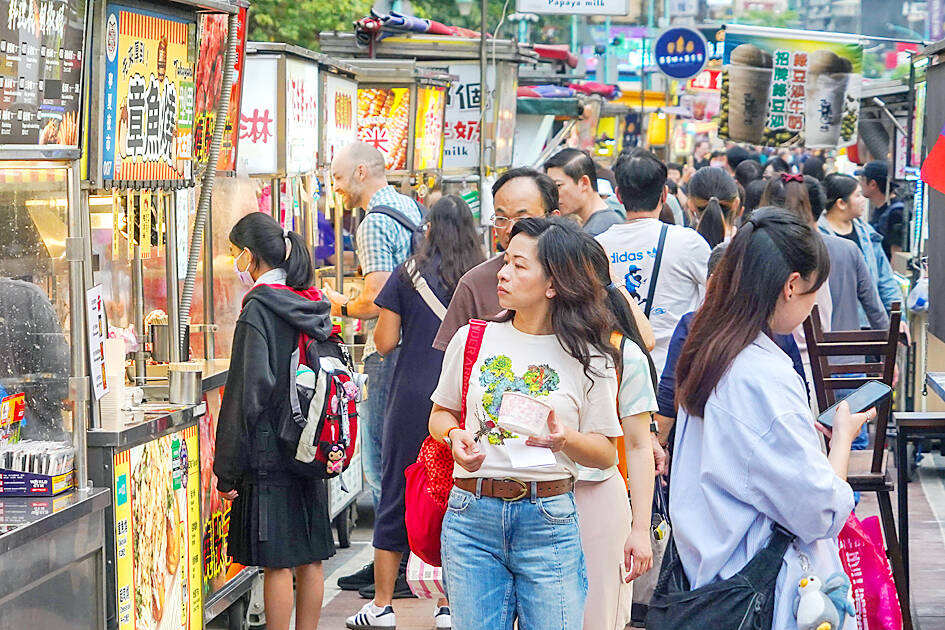The nation’s consumer price index (CPI) last month rose 1.55 percent year-on-year, the mildest increase for the same month in four years and below the central bank’s 2 percent target, the Directorate-General of Budget, Accounting and Statistics (DGBAS) said yesterday.
The agency attributed the result to sharp declines in food and energy prices.
Core CPI — which strips out volatile food and energy components — rose 1.61 percent year-on-year last month, also showing signs of moderation, it said.

Photo: CNA
“The inflationary gauge is likely to slacken further this month given current favorable weather for crops and a high base last year,” DGBAS official Tsao Chih-hung (曹志弘) said.
CPI growth should stay below 2 percent through the second half of the year, with electricity rates held intact, raw material prices falling and cheaper import costs, Tsao said.
However, Tsao said that structural inflationary pressures remain, as dining-out costs rose 3.5 percent last month, the fastest pace in 15 months amid continued increases in the cost of ingredients and labor.
In addition, 17 key consumer goods tracked by the Executive Yuan continued to show steady price gains, up 0.8 percent from a year earlier, marking a third consecutive month of increases, he said.
In terms of CPI components, food prices rose 3.09 percent year-on-year as fruit prices surged 18.56 percent on limited supply, while meat and dining-out costs climbed 4.8 percent and 3.5 percent respectively.
These gains were partially offset by falling egg and vegetable prices, the DGBAS said.
Prices of miscellaneous goods grew 2.44 percent, driven by a 6.52 percent jump in personal accessories such as jewelry, and price hikes in personal care and tobacco products, the agency said.
Healthcare costs rose 2.18 percent, as medical facilities raised registration fees and charges for services such as dentures and orthodontics, it added.
Shelter costs advanced 1.8 percent, led by rises in rent and household service costs. Rents increased 2.28 percent, decelerating from previous months, but still elevated, Tsao said.
The government is to review the minimum wage later this year and any potential increase would not go into practice until next year, he said.
Meanwhile, the producer price index (PPI), a measure of the price movements of goods from a seller’s perspective, last month fell 4.3 percent year-on-year, reflecting prevalent declines in global commodity prices, including oil, chemicals, metals and semiconductors, Tsao said.
The retreat was amplified by the New Taiwan dollar’s 7.09 percent appreciation versus the US dollar in the month, he said.
Tsao pointed to weakened global demand amid ongoing US-China tariff tensions as a key reason for broad-based declines in raw material prices such as corn, soybeans and industrial metals.
For the first five months of this year, the CPI increased 2.04 percent, while the PPI grew 1.45 percent from the same period last year, the DGBAS said.

CAUTIOUS RECOVERY: While the manufacturing sector returned to growth amid the US-China trade truce, firms remain wary as uncertainty clouds the outlook, the CIER said The local manufacturing sector returned to expansion last month, as the official purchasing managers’ index (PMI) rose 2.1 points to 51.0, driven by a temporary easing in US-China trade tensions, the Chung-Hua Institution for Economic Research (CIER, 中華經濟研究院) said yesterday. The PMI gauges the health of the manufacturing industry, with readings above 50 indicating expansion and those below 50 signaling contraction. “Firms are not as pessimistic as they were in April, but they remain far from optimistic,” CIER president Lien Hsien-ming (連賢明) said at a news conference. The full impact of US tariff decisions is unlikely to become clear until later this month

With an approval rating of just two percent, Peruvian President Dina Boluarte might be the world’s most unpopular leader, according to pollsters. Protests greeted her rise to power 29 months ago, and have marked her entire term — joined by assorted scandals, investigations, controversies and a surge in gang violence. The 63-year-old is the target of a dozen probes, including for her alleged failure to declare gifts of luxury jewels and watches, a scandal inevitably dubbed “Rolexgate.” She is also under the microscope for a two-week undeclared absence for nose surgery — which she insists was medical, not cosmetic — and is

GROWING CONCERN: Some senior Trump administration officials opposed the UAE expansion over fears that another TSMC project could jeopardize its US investment Taiwan Semiconductor Manufacturing Co (TSMC, 台積電) is evaluating building an advanced production facility in the United Arab Emirates (UAE) and has discussed the possibility with officials in US President Donald Trump’s administration, people familiar with the matter said, in a potentially major bet on the Middle East that would only come to fruition with Washington’s approval. The company has had multiple meetings in the past few months with US Special Envoy to the Middle East Steve Witkoff and officials from MGX, an influential investment vehicle overseen by the UAE president’s brother, the people said. The conversations are a continuation of talks that

CHIP DUTIES: TSMC said it voiced its concerns to Washington about tariffs, telling the US commerce department that it wants ‘fair treatment’ to protect its competitiveness Taiwan Semiconductor Manufacturing Co (TSMC, 台積電) yesterday reiterated robust business prospects for this year as strong artificial intelligence (AI) chip demand from Nvidia Corp and other customers would absorb the impacts of US tariffs. “The impact of tariffs would be indirect, as the custom tax is the importers’ responsibility, not the exporters,” TSMC chairman and chief executive officer C.C. Wei (魏哲家) said at the chipmaker’s annual shareholders’ meeting in Hsinchu City. TSMC’s business could be affected if people become reluctant to buy electronics due to inflated prices, Wei said. In addition, the chipmaker has voiced its concern to the US Department of Commerce